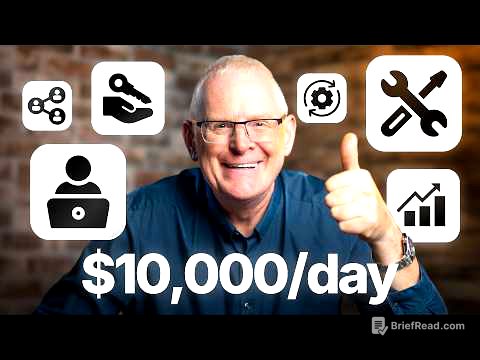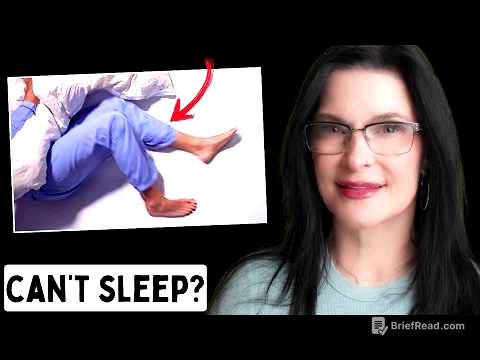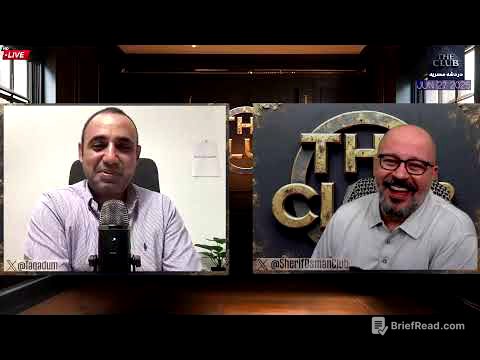TLDR;
This video challenges the perception of life's complexity, suggesting that simple principles underlie success, happiness, and personal growth. It explores paradoxes like the harder you try, the more you fail, and the more you seek control, the less you have. The video also discusses the brain's functions, emotional influences, memory's malleability, the 80/20 principle, habit formation, and the power of compounding small improvements.
- Life is simple, but we complicate it by seeking complex solutions.
- Focus on actions and reactions, accepting what you can't control.
- Small daily improvements compound into significant long-term results.
Introduction [0:00]
The video starts by stating that life is simpler than we think, and we often complicate it by searching for complex solutions instead of embracing simple answers. Self-help advice, relationship advice, and success stories often boil down to basic principles, but people are drawn to complexity. The key is to recognize that life's answers are often simple, and the search for complexity is the real complexity.
Chapter 1: "The Effort Paradox" [1:06]
The harder you try, the more you fail. This is illustrated through examples like sleep, happiness, and love, which cannot be forced. This concept is known as the backwards law, where wanting something intensely can make it more elusive. Desperation, neediness, and stress repel opportunities, relationships, and peace, respectively. Effort without attachment and action without desperation are more effective, as life rewards the relaxed, not the lazy.
Chapter 2: "The Control Paradox" [2:17]
The more you try to control everything, the less control you have. Life often throws curveballs despite meticulous planning. Control is like holding water; the tighter you squeeze, the faster it slips through your fingers. Focus on your circle of influence (actions and reactions) and ignore your circle of concern (things you cannot control). Instead of trying to control life, master your response to it.
Chapter 3: "Your Brain's Secret Night Shift" [3:31]
While you sleep, your brain cleanses itself by washing out toxins through cerebral spinal fluid. During deep sleep, the brain physically shrinks to create space for this process. Poor sleep leads to metabolic waste accumulation, hindering cognitive functions. This nightly reset affects memory and creativity, highlighting the importance of sleep for brain maintenance.
Chapter 4: "The Happiness Trap" [4:48]
Happiness is elusive when directly pursued. It is a byproduct of progress, connection, and contribution, not achievement or possessions. The brain has a happiness set point, and people generally return to this baseline after significant events. Stop chasing happiness directly and focus on meaning, growth, and contribution.
Chapter 5: "Your Biased Brain" [6:00]
The brain is a pattern-matching machine, not a truth-seeking one, and operates with numerous cognitive biases. Confirmation bias, the halo effect, and loss aversion distort perception. People judge others by their actions but themselves by their intentions, remember successes more than failures, and exhibit illusory superiority. Awareness of these biases is crucial, as the brain constantly edits reality to match beliefs.
Chapter 6: "The 90/10 Emotional Rule" [7:31]
90% of decisions are emotional, and only 10% are logical. Emotions process information much faster than logic, influencing decisions before conscious thought. Emotions are data, not directives, and the pause between feeling and action is where true power lies.
Chapter 7: "Memory: Your Personal Fiction Writer" [8:38]
Memories are not recordings but malleable constructs that change each time they are recalled. The brain fills gaps, modifies details, and invents things, making memories unreliable. Since memories are stories, not documentaries, people can consciously edit them by choosing which parts to emphasize.
Chapter 8: "The 80/20 Life Principle" [9:55]
20% of efforts create 80% of results. This principle applies to relationships, tasks, habits, business, and personal belongings. Identify the vital 20% and focus on it, cutting out the rest. Life is exponential, not fair, so concentrate on activities and relationships that move the needle.
Chapter 9: "Habit Loops: Your Autopilot System" [11:11]
Habits follow a cue-routine-reward pattern. The brain runs these loops regardless of whether they are helpful or harmful. Habits cannot be deleted but can be replaced by changing the routine while keeping the same cue and reward. Consciously designing habit loops can make autopilot an ally.
Chapter 10: “The Compound Effect Secret" [12:21]
1% daily improvement leads to a 3,778% yearly improvement. Small choices create significant destinies through compound interest. Overestimating what can be done in a day and underestimating what can be done in a year is a common mistake. The compound effect works in reverse, too, so consistent small actions are crucial. Focus on systems, not goals, and let the compound effect handle the rest.









